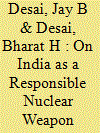| Srl | Item |
| 1 |
ID:
180283


|
|
|
|
|
| Summary/Abstract |
India conducted Operation Shakti (Pokhran II) nuclear tests during 11–13 May 1998 that ushered her into the cherished nuclear weapons club. It was well calibrated decision to formally choose the nuclear path through the first peaceful nuclear explosion, Smiling Buddha (Pokhran I) that was conducted on 18 May 1974. It was significant that without joining the 1968 Nuclear Non-proliferation Treaty, India managed to gatecrash into the nuclear weapons capability. It led to articulation of the No First Use (NFU) doctrine on 4 January 2003 (Ministry of External Affairs [MEA], 2003). In the wake of 16 August 2019 pronouncement of the Indian Defence Minister on possible review of the NFU, this article seeks to probe the question: Does the NFU doctrine require any such review? It comprises the rational, the promise of NFU, counterforce strategies, NFU with respect to tactical nuclear weapons and associated problems with First Use and NFU.
|
|
|
|
|
|
|
|
|
|
|
|
|
|
|
|
| 2 |
ID:
173223


|
|
|
|
|
| Summary/Abstract |
This study seeks to make a modest effort to look back at the marathon peacemaking ushered into by the Treaty of Versailles, during 1919–1922 periods, after Armistice was signed on 11 November 1918, bringing to an end the First World War. It has sought to place under scanner the said arduous process of peacemaking, resulting in an imposing corpus of five treaties comprising 1914 articles with Germany and its four other allies (Austria, Bulgaria, Hungary and Turkey). It presents an interesting role of the principal peacemakers therein along with the advent of the era of ‘organizing’ through the League of Nations and other entities such as International Labour Office and Permanent Court of International Justice. Now, at the distance of 101 years from the main event that heralded new milestones in international law and international relations, we have sought to make sense of it so as to deduce lessons to look ahead for our better world. Knowing well that alike human beings, any peacemaking cannot be flawless, it has been our endeavour to provide an objective understanding of the great peacemaking, its aftermath (1919–1939) and its relevance for the United Nations–led world order in the 21st century.
|
|
|
|
|
|
|
|
|
|
|
|
|
|
|
|